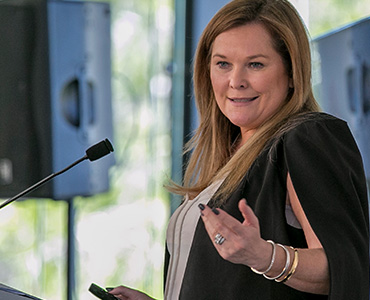Stereotypes that pervade for our young girls is that tech whizzes are the Zuckerberg’s, gaming is for guys and coding is for geeks Microsoft Australia Managing Director, Pip Marlow has told a CEDA audience in Perth.
 “Girls are getting a message from a very young age, technology and girls don’t mix,” she said.
“Girls are getting a message from a very young age, technology and girls don’t mix,” she said.
“Getting more women into STEM and more women into leadership positions is not a problem for women to solve, it is a human problem.
“There is a stark reality in front of us. (Only) twenty eight per cent of STEM roles today are filled by women.
“I think this conversation is critical for…Australia’s future. I think it’s critical to be tapping into the power and potential of the entire population.
“The Federal Government…recently announced $51 million over five years to fund a number of STEM initiatives in schools, and whilst that is a good start I have to ask the question, is it enough?
“In 2013 the US government invested $3.1 billion into STEM and actually that is 10 times more investment per capita than here in Australia.
“I’m not just saying it’s a government problem alone to solve…we all have a role in driving that change because we don’t want to look back in a decade and see the statistics the same as they are today.
“There is a lot of conversation around STEM, but I really like the conversation on STEAM which adds the arts on to it. I think it is about bringing the power of creativity and how technology and innovation can bring that creativity to life for our consumers, our customers…that is where the magic happens.”
Ms Marlow also discussed the importance of role models as “it is difficult for young girls…to be what they can’t see.”
Also speaking at the event was Shell Australia, General Manager Production, Michael Schoch, who highlighted the challenges Western Australia faces in achieving gender diversity.
“WA measures poorly on many gender diversity indexes…from board directorships and representation at senior levels in our organisations, through to the gender pay gap,” he said.
“The consequence of this is the starting point from which to establish the momentum for change is behind the rest of the country.
“Two statistics in particular should concern us all given the primacy of the mining, energy and construction industries in WA, and those industries’ reliance upon STEM based capabilities.
“Firstly… the Chamber of Minerals and Energy WA (CME) recently published a report entitled Diversity in the Western Australian Resources Sector. Disappointingly, female participation had decreased by one per cent to 17.8 per cent over the last two years.
“Given women make up 44 per cent of the total workforce in Western Australia this continues to be a significant under-representation.
“Secondly,… for 30 years now…as many women as men have graduated from Australian universities, yet today less than 15 per cent of graduates entering engineering related operational roles at a graduate level are women.
“Whether you view gender diversity through a prism of social justice, economic productivity, simple fairness, or indeed all three, it must be framed not as an issue of gender, but for what it really is… an issue of leadership.
“I work for an organisation that, whilst not perfect, is sincere in its efforts to achieve greater gender equality.”
Mr Schoch said Shell Australia embrace policies including flexible working, extended paid parental leave, childcare facilities in offices, targeted career development programs and annual gender pay audits where outcomes are shared.
Mr Schoch said there need to be steps taken to ensure participation in STEM subjects.
“Research shows that the vast majority of girls in Australia steer clear of STEM subjects at school, which flows through to choices made at the tertiary level,” he said.
“Young girls’ curiosity and aptitude for STEM subjects should be encouraged from day one. Teachers and parents share responsibility for encouraging young girls to develop their aptitude in maths and science subjects.”
Programmed Managing Director, Chris Sutherland echoed the importance of STEM as well as parent and teacher involvement in dispersing stereotypes in jobs.
“Parents and teachers most definitely create impressions that some jobs are for boys and some are for girls from a very early age,” he said.
“It is the observed behaviour of our young girls that leads to decisions made later in life.
“More than a quarter of all girls in Australia do no maths at all after year 10.
“We pretend that not doing maths will not harm any of your prospects going forward whereas the truth is that undertaking maths in year 11 and year 12 will keep all of your career options open.
“I do directly link the low percentage of girls doing intermediate or advanced maths in year 11 and 12 to the gender pay gap in WA, because I firmly believe that job career and high-income success in many of the non-traditional female roles require reasonable mathematical ability – that includes the trade space occupations like electrician or a painter.
“It is the painter or electrician…who can measure work sites, estimate costs and deliver against budget – in a sense, make the firm a profit – that generally becomes a supervisor, project manager, sales manager and other more senior roles in an organisation where higher rates of pay are earned.
This event was part of CEDA’s Women in Leadership series. To see more from Women in Leadership events around Australia, click here.